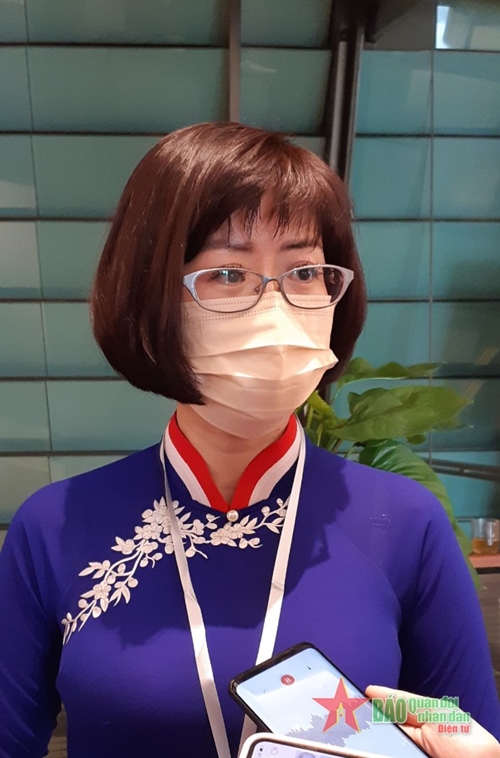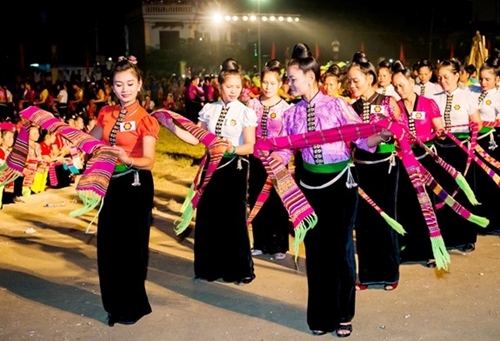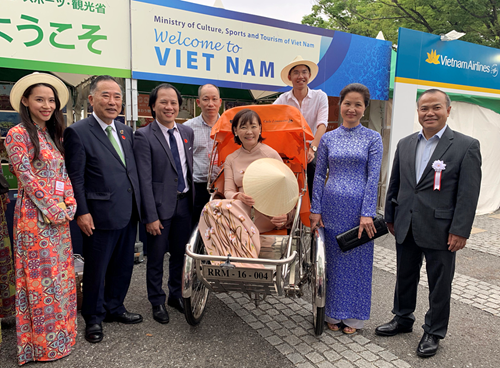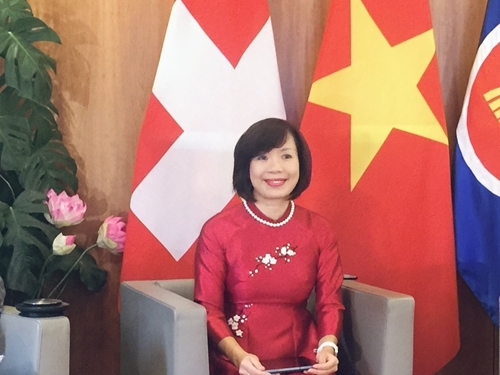UNESCO honors Vietnam’s culture
In mid-December 2021, the Xoe dance of Thai ethnic people of Vietnam was recognized as Intangible Cultural Heritage of Humanity by the United Nations Educational, Scientific and Cultural Organization (UNESCO). Ambassador Le Thi Hong Van, Head of the Vietnamese Permanent Delegation to UNESCO was touched when receiving the news while attending the online 16th session of the Intergovernmental Committee of the 2003 Convention for the Safeguarding of the Intangible Cultural Heritage in Hanoi.
    |
 |
|
Ambassador Le Thi Hong Van, Head of the Vietnamese Permanent Delegation to UNESCO |
With the recognition, Xoe dance of Thai ethnic minority people becomes Vietnam’s 14th intangible cultural heritage element to be recognized by UNESCO. In the year, Nui Chua (Ninh Thuan province) and Kon Ha Nung Plateau (Gia Lai province) were recognized as Global Biosphere Reserves, and two Vietnamese famous poets Ho Xuan Huong and Nguyen Dinh Chieu were honored as “World Cultural Celebrities.”
Talking about the honor, Ambassador Le Thi Hong Van affirmed that the recognitions were the shared achievements of localities having heritage elements, the Ministry of Culture, Sports and Tourism, the Vietnamese National Commission for UNESCO, the Ministry of Foreign Affairs, and the Vietnamese Permanent Delegation to UNESCO.
    |
 |
|
Xoe dance of Thai ethnic people |
She recalled that right after the session, around 20 ambassadors called her to show their admiration for Vietnam. They said that they were impressed by the participation and speeches of the leader of Vietnam’s Ministry of Culture, Sports and Tourism and localities’ representatives at the event. This demonstrated Vietnam’s strong commitment to preserving and promoting values of heritages, which UNESCO has been trying to.
Together with achievements in heritage field, in 2021, Vietnam’s cultural diplomacy was promoted in UNESCO. The diplomat recalled that after the International Coordinating Council of the Man and the Biosphere Program (CIC-MAB) recognized Nui Chua and Kon Ha Nung as World Biosphere Reserves at its the 33rd session, a short video of the two places was played by Vietnamese participants at the event and fascinated delegates. Participants were extremely interested in the wonderful beauty of Nui Chua and Kon Ha Nung, and at the same time admired Vietnam for its careful preparation. It was the fastest and most effective way to popularize Vietnam and its people to the world, said Van.
As part of his official visit to France in November 2021, Prime Minister Pham Minh Chinh paid a visit to the headquarters of UNESCO in Paris at the time when UNESCO was marking its 76th founding anniversary and 45-year Vietnam-UNESCO relations, and UNESCO’s General Assembly was about to convene the 41st session after two-year delay due to the COVID-19 pandemic. During the conversation with UNESCO’s Director-General Audrey Azoulay, the Vietnamese Prime Minister shared that Vietnam is about to organize the first National Cultural Conference and approve the strategy for cultural development by 2030. UNESCO’s leader said that Vietnam is one of the few countries having such a specific strategic approach to culture. She pledged to continue supporting Vietnam’s education, human resource capacity building, culture, science, and information and communications.
Apart from being elected to the UNESCO Executive Council for the 2021-2025 tenure with the largest number of yes votes, Vietnam have been highly appreciated by friends and partners for its efforts and contribution to UNESCO over the past time. This not only affirms the leading capability of Vietnam’s diplomacy, but also demonstrates the new soft power and the role of Vietnam, said Ambassador Le Thi Hong Vam.
“Soft power” of Vietnam’s “ao dai”
Vietnamese Ambassador to Japan Vu Hong Nam is one of the diplomats active in popularizing Vietnam’s culture and cuisine to the country. According to him, apart from activeness, each diplomat should be more proactive and bolder in popularizing Vietnam’s cultural values to the world and raising soft power of Vietnam’s diplomacy.
Taking the popularization of Vietnam’s ao dai (Vietnamese traditional long dress) in Japan as a typical example, Ambassador Vu Hong Nam recalled that he personally invited artisans living in Ho Chi Minh City to Tokyo to tailor ao dai for Japanese officials and spouses of the country’s leaders.
    |
 |
|
Vietnamese Ambassador to Japan Vu Hong Nam (first from right) helps popularize Vietnam’s ao dai in Japan. (Photo: Vnexpress) |
Noticing that Japanese women were shy wearing ao dai, the Vietnamese diplomat told them a story about Ms Abe Akie, former Japanese Prime Minister Abe Shinzo’s spouse, when she attended Vietnam Festival in Tokyo in 2019. That day, Ms. Abe Akie in an ao dai sitting on a cyclo posing for photos attracted the attention of thousands of festival goers. Ms. Satsuki Katayama, Minister in charge of Regional Revitalization, also wore Vietnam’s ao dai.
Being encouraged by the ambassador, Japanese friends agreed to try them on and then loved the softness and gracefulness of Vietnam’s ao dai. The image of Japanese female officials and Japanese leaders’ spouses wearing ao dai spread widely on Japan’s media, drawing public attention.
In addition to that, Ambassador Vu Hong Nam has done utmost to popularize Vietnam’s cuisine in the “land of rising sun.” The diplomat said that during his trips to different places, he always visits Vietnamese restaurants in the host localities to learn about overseas Vietnamese life and how Vietnam’s culture has been practiced in the localities. He also invites local officials to those restaurants to help them learn more about Vietnam. With the ambassador’s support, mi Quang (Quang Nam province’s famous noodle soup), pho, or different kinds of fruits, including banana and lychees could gain their firm position in the Japanese market.
Sharing the journey of Vietnam’s coriander to Japan, Ambassador Vu Hong Nam said that Japanese people were first scared of the herb’s smell, but now they love it. He told Japanese friends that coriander with natural antibiotics is good to people’s health and their digestive system. Having been convinced by Nam, many people tried and loved it. Now coriander is an indispensable to them when eating pho. This has led to changes in Japan’s agriculture imports from Vietnam, and event this herb is grown in Japan.
Technologies of Industry 4.0 – A bridge to connect culture in pandemic time
As one of the Vietnamese female ambassadors sent to different countries around the world, Vietnamese Ambassador to Switzerland Le Linh Lan understands strength of a female diplomat.
    |
 |
|
Vietnamese Ambassador to Switzerland Le Linh Lan (Photo: www.baoquocte.vn) |
According to her, Vietnamese female ambassadors have advantages in carrying out diplomatic work, especially when they wear traditional ao dai. As an ambassador in Mexico and now in Switzerland, Lan always notices international friends’ appreciation of Vietnam’s culture. As European countries uphold gender equality, they always create favorable conditions for female diplomats to work. All Vietnamese ambassadors to European countries have closely cooperated with the host governments to conduct diplomatic activities and received much support from them.
The diplomat said that due to the complicated developments of the COVID-19 pandemic, Vietnamese Embassy in Switzerland’s direct cultural promotion activities have been postponed. Therefore, the embassy has changed its forms of operation and quickly applied information technology, especially technological advances of the fourth industrial revolution, to implementing activities. It has been a bridge to connect cultures over past two years, contributing to popularizing Vietnam’s image to international friends.
To better popularize Vietnam, culture, and people to international friends in the pandemic time, Ambassador Le Linh Lan emphasized the need to promote investment in human resources, infrastructure, and digital products. If it is done well, Vietnam’s “soft power” will be enhanced, contributing to turning Vietnam into an attractive destination in terms of culture, people, and a dynamic and potential economy. It is because together with doing their business, foreign enterprises want to learn more about Vietnam and its people.
Emphasizing the harmonious and inseparable relations among culture, economy, and politics, the diplomat said that application of technologies of Industry 4.0 will be a key method in carrying out cultural diplomacy in the new period.
It is obvious that as heads of Vietnam’s representative offices in foreign countries, ambassadors have always tried their best to promote “soft power” of diplomacy and become a bridge between Vietnam’s and host countries’ cultures, contributing to promoting cooperation in economy, trade, and investment. As Minister of Foreign Affairs Bui Thanh Son said at Cultural Diplomacy Conference on December 20 2021, cultural diplomacy’s task is making people around the world know about and love Vietnam and choose to use its products and services, thus facilitating the development of localities, people, and businesses.
Translated by Tran Hoai